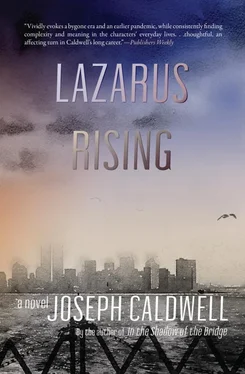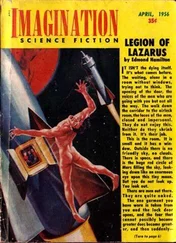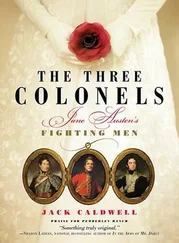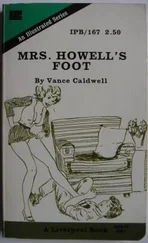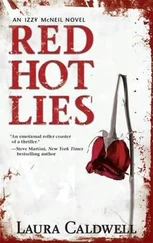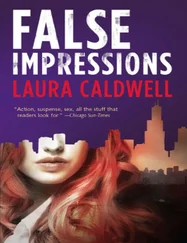She finished the scrubbing. She slipped the brush back into the pail so it wouldn’t splash. When she braced her hand against the floor to help her stand up, she realized that the task she’d chosen, scrubbing the floor, was a task that could be performed only on one’s knees. She wanted to laugh, but nothing seemed funny to her anymore.
Dempsey’s next attempt was a cliché, but clichés became clichés because, more often than not, they began as a truth: She would give herself to good works. If she were the beneficiary of divine intervention, if she was, indeed, one chosen among many, she should at least offer some token of gratitude. And if she was merely a freak case, yet one more of nature’s playful little tricks, she had nothing to lose. She might accrue an even greater grace from the act since it had no purpose beyond itself. It would gain her nothing. It would simply be. The degree of merit she would leave for others to decide. She herself would just go and do it.
Her choice was an obvious one. Johnny had told her about the soup kitchen run by the good priest—Father Dunphy if she remembered correctly. It was on a specific day of the week, at a specific hour. Johnny had also told her where the church was, not too far uptown, in the Village. It was the church in which they were to be married. She would go to the soup kitchen and offer her services. It might have no effect; it might do nothing to rouse her from the stunned state her cure had inflicted, but it might be of some help to others and she had no real objection. (She recalled the words of Sister Sarah on the subject; “If you’re a Catholic and you don’t make the poor your first concern, you’re nothing but a freeloader. To those who ignore or, worse, punish the poor, the Eucharist, the Body and Blood of Christ, becomes nothing but a free lunch. God gag them, I say.”)
And so, wearing her jeans and a paint-spattered T-shirt, Dempsey dutifully went, prepared to accept whatever might happen, even though she had little interest in what it might be.
The church looked like an Irishman’s idea of a Greek temple. It had fluted columns in front, but the rest was made of stones cleared from what must have been the surrounding pastures, the grazing land upon which it had been built more than a century and a half before, as a plaque informed her. The columns’ claims of a lineage that went back to antiquity were allowed to grace the portico and the facade, but the actual stones must have known the rooting of cows and sheep, horses and pigs. The walls were ramparts culled from the rocky earth; a fortress for a pastoral rather than a mighty God. There was a sturdy honesty to the structure itself that suggested a homely faith hospitable to glory and to grandeur.
Along the side of the church and down the block the long line of people ran. Most were men. The dress code was obviously casual. No rags or tatters were readily visible but little thought seemed to have been given to the fit and cut of what was being worn, mostly sweats and T-shirts. The line itself was formed on a ramp coming from the direction opposite to where Dempsey stood, at the top of some stone steps that led down to the church basement. It seemed that as a volunteer she should go down the steps, through the door, into the basement, and offer her services. And she should not hesitate. The line was already moving. But she did hesitate.
A man carrying a huge black plastic garbage bag on his shoulder, the bag stuffed, it seemed, with empty beer and soda cans, was passing through the door, the man a reverse Santa Claus collecting the city’s clutter, the recipient of urban largesse rather than the dispenser of unearned gifts and undeserved toys. Behind him was a woman who looked like a schoolteacher, gray hair pulled back into a bun, steel-rimmed glasses, a plaid skirt and a cardigan unbuttoned over a pale green blouse. She wore white shoes, not all that scuffed, and ankle socks with dainty pink flowers embroidered at the top. In her hand was an empty two-pound Maxwell House coffee can without a lid. Perhaps she was hoping for carry-out. Next came a teenager, a boy, with scabs on his nose and under his right eye. His T-shirt was dirty and torn at the neck so that some of the material flapped away from his chest, exposing his right nipple.
As the teenager was passing through the door, Dempsey turned away from the steps and went down the street, past the ramp, along the file of people and took her place in line. This was where she felt she belonged. In front of her were two men who stopped talking and faced front the moment she joined them. One had just said, “You can’t do it that way. That way, they won’t oblige. You got to get them to oblige.”
Nothing more was said, as if Dempsey were there to enforce discipline and ensure proper conduct. A man singing inaudible words interspersed with an occasional “Yeah” came into the line behind her. And behind him came a young man with long hair and a vacant stare that made him look like a deposed comic-book prince who had been sent out into beggary and would never find his way back to hearth and home.
Dempsey lifted her tote bag and held it against her chest so it wouldn’t rub the knee of the man behind her or hit the leg of the man in front. Why she had brought the tote, she had not the least idea. Habit, probably. There would be little opportunity for knitting or for reading the book buried somewhere toward the bottom. The clean underclothes kept there for emergencies, the shield replacements and, probably, an extra shield, which should have no purpose for her now. Nor would she ever need again the small box of latex gloves tucked in there somewhere, or the colored pencils and sketchpad she’d stuffed into the bag the afternoon she’d gone to see Doctor Norstar, hoping Joey might be there and he and she would draw together to make some peace between them. But Joey hadn’t been there. Only Doctor Norstar and the movers. Chances were that she would never see Joey again; they would never draw, they would never make their peace. Dempsey hugged the bag closer.
Slowly the line moved, but steadily. The men ahead of her never spoke again; the man behind her continued his song and the interspersed “Yeah’s.” Since she didn’t turn around, she knew nothing of the deposed prince. Dempsey did not plan to stay for lunch. She had no idea why she’d placed herself in the line to begin with, except that it seemed right. She just had the feeling she belonged there rather than among the volunteers. But to accept food seemed unfair and not far from theft.
Once inside, however, she stayed in line, accepted the buttered bread, the bowl of what looked like a barley soup with huge chunks of meaty sausage and fresh vegetables—red cabbage, carrots, and celery. She accepted the sliced peaches and the coffee. As she had dutifully waited on line, it seemed the proper thing to do. And then it came to her, that perhaps the reason why she felt drawn to wait on the line was she still didn’t quite believe that she was being allowed to live.
Most of the long tables were full but she saw an empty place facing the wall in a far corner. A man with a scraggly beard brushed past her, almost knocking the tray from her hand. She brought up her other hand, the one carrying the tote bag, and reinforced her hold. The tote swung back and forth against her stomach, the bottom corner hitting her repeatedly in the crotch. She moved toward the empty chair. An older man in a brown overcoat rushed by and Dempsey was certain he was headed for the same place, but he swerved to the right and sat down in front of an empty tray on a table near the middle of the room.
The overhead fluorescent strips made the room over-bright, without shadow, and Dempsey felt she was moving through air made brittle by the light. A wrong or hasty move and the air might shatter, leaving it in shards, pieces scattered at her feet. On she moved, slowly, carefully, not just to avoid disrupting the fragile air but because she hoped some mental process would catch up with her, bringing some understanding of why she was doing what she was doing. But her mind was in no hurry to go anywhere, and Dempsey herself felt no eagerness for goads and prods. She had only to keep moving, to do what she was doing, and not require anything beyond the event itself. By the time she reached the chair, she no longer cared that the corner of her tote bag had been poking her in the crotch and that she had slopped some of the soup onto the tray.
Читать дальше
